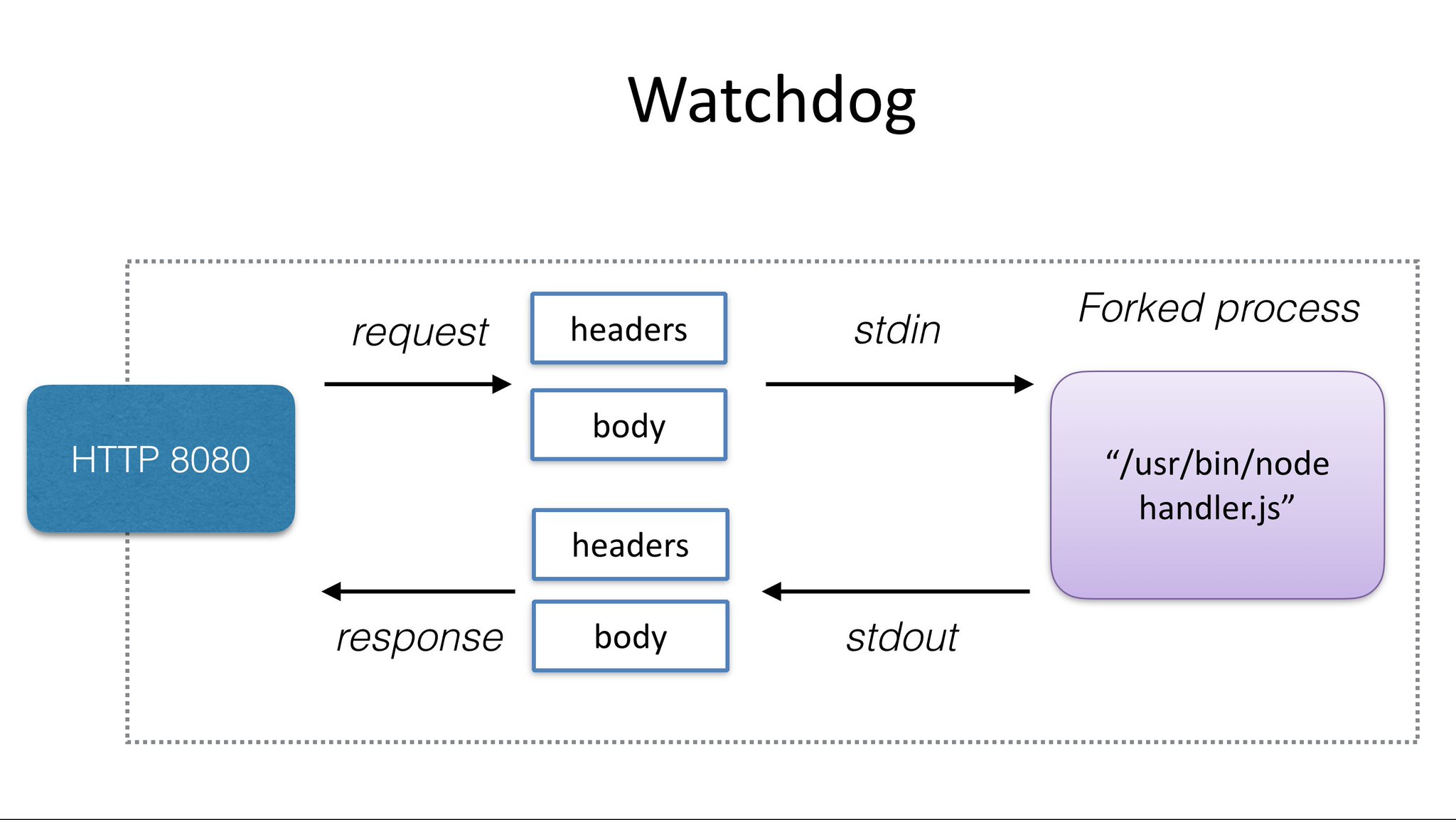Watchdog¶
The watchdog provides an unmanaged and generic interface between the outside world and your function. Its job is to marshal a HTTP request accepted on the API Gateway and to invoke your chosen appliaction. The watchdog is a tiny Golang webserver - see the diagram below for how this process works.

Above: a tiny web-server or shim that forks your desired process for every incoming HTTP request
Every function needs to embed this binary and use it as its ENTRYPOINT or CMD, in effect it is the init process for your container. Once your process is forked the watchdog passses in the HTTP request via stdin and reads a HTTP response via stdout. This means your process does not need to know anything about the web or HTTP.
Create a new function the easy way¶
Create a function via the CLI
The easiest way to create a function is to use a template and the FaaS CLI. The CLI allows you to abstract all Docker knowledge away, you just have to write a handler file in one of the supported programming languages.
Package your function¶
Here's how to package your function if you don't want to use the CLI or have existing binaries or images:
- Use an existing or a new Docker image as base image
FROM - Add the fwatchdog binary from the Releases page via
curlorADD https:// - Set an
fprocessenvironmental variable with the function you want to run for each request - Expose port
8080 - Set the
CMDtofwatchdog
Example Dockerfile for an echo function:
FROM alpine:3.5 ADD https://github.com/openfaas/faas/releases/download/v0.5-alpha/fwatchdog /usr/bin RUN chmod +x /usr/bin/fwatchdog # Define your UNIX binary here ENV fprocess="/bin/cat" CMD ["fwatchdog"]
Implementing a Docker Healthcheck¶
A Docker Healthcheck is not required but is best practice. It will make sure that the watchdog is ready to accept a request before forwarding requests via the API Gateway. If the function or watchdog runs into an unrecoverable issue Swarm will also be able to restart the container.
Here is an example of the echo function implementing a healthcheck with a 5-second checking interval.
FROM functions/alpine ENV fprocess="cat /etc/hostname" HEALTHCHECK --interval=5s CMD [ -e /tmp/.lock ] || exit 1
The watchdog process creates a .lock file in /tmp/ on starting its internal Golang HTTP server. [ -e file_name ] is shell to check if a file exists. With Windows Containers this is an invalid path so you may want to set the suppress_lock environmental variable.
Read my Docker Swarm tutorial on Healthchecks:
Environmental Overrides:¶
The watchdog can be configured through environmental variables. You must always specifiy an fprocess variable.
| Option | Usage |
|---|---|
fprocess |
The process to invoke for each function call. This must be a UNIX binary and accept input via STDIN and output via STDOUT. |
cgi_headers |
HTTP headers from request are made available through environmental variables - Http_X_Served_By etc. See section: Handling headers for more detail. Enabled by default. |
marshal_requests |
Instead of re-directing the raw HTTP body into your fprocess, it will first be marshalled into JSON. Use this if you need to work with HTTP headers and do not want to use environmental variables via the cgi_headers flag. |
content_type |
Force a specific Content-Type response for all responses. |
write_timeout |
HTTP timeout for writing a response body from your function (in seconds) |
read_timeout |
HTTP timeout for reading the payload from the client caller (in seconds) |
suppress_lock |
The watchdog will attempt to write a lockfile to /tmp/ for swarm healthchecks - set this to true to disable behaviour. |
exec_timeout |
Hard timeout for process exec'd for each incoming request (in seconds). Disabled if set to 0. |
write_debug |
Write all output, error messages, and additional information to the logs. Default is false. |
Advanced / Tuning¶
Working with HTTP Headers¶
Headers and other request information are injected into environmental variables in the following format:
The X-Forwarded-By header becomes available as Http_X_Forwarded_By
Http_Method- GET/POST etcHttp_Query- QueryString valueHttp_ContentLength- gives the total content-length of the incoming HTTP request received by the watchdog.
This behaviour is enabled by the
cgi_headersenvironmental variable which is enabled by default.
Here's an example of a POST request with an additional header and a query-string.
$ cgi_headers=true fprocess=env ./watchdog &
2017/06/23 17:02:58 Writing lock-file to: /tmp/.lock
$ curl -X POST "localhost:8080?q=serverless&page=1" \
-H X-Forwarded-By:http://my.vpn.com
This is what you'd see if you had set your fprocess to env on a Linux system:
Http_User_Agent=curl/7.43.0 Http_Accept=*/* Http_X_Forwarded_By=http://my.vpn.com Http_Method=POST Http_Query=q=serverless&page=1
You can also use the GET verb:
$ curl "localhost:8080?action=quote&qty=1&productId=105"
The output from the watchdog would be:
Http_User_Agent=curl/7.43.0 Http_Accept=*/* Http_Method=GET Http_Query=action=quote&qty=1&productId=105
You can now use HTTP state from within your application to make decisions.
HTTP Methods¶
The HTTP methods supported for the watchdog are:
With a body:
* POST, PUT, DELETE, UPDATE
Without a body:
* GET
Info
The API Gateway currently supports the POST route for functions.
Content-Type of Request/Response¶
By default the watchdog will match the response of your function to the "Content-Type" of the client.
- If your client sends a JSON post with a Content-Type of
application/jsonthis will be matched automatically in the response. - If your client sends a JSON post with a Content-Type of
text/plainthis will be matched automatically in the response too
To override the Content-Type of all your responses set the content_type environmental variable.
I don't want to use the watchdog¶
This is an unsupported use-case for the OpenFaaS project however if your container exposes HTTP POST on port 8080 then the OpenFaaS API gateway and other tooling will manage your container.
Tuning Auto-scaling¶
Auto-scaling starts at 1 replica and steps up in blocks of 5:
- 1->5
- 5->10
- 10->15
- 15->20
You can override the upper limit of auto-scaling by setting the following label on your container:
com.faas.max_replicas: "10"
If you want to disable scaling, set the com.faas.max_replicas value to "1".
Contribute to the Watchdog¶
To contribute to the OpenFaaS Watchdog component checkout the "./build.sh" scripts and acompanying Dockerfiles.